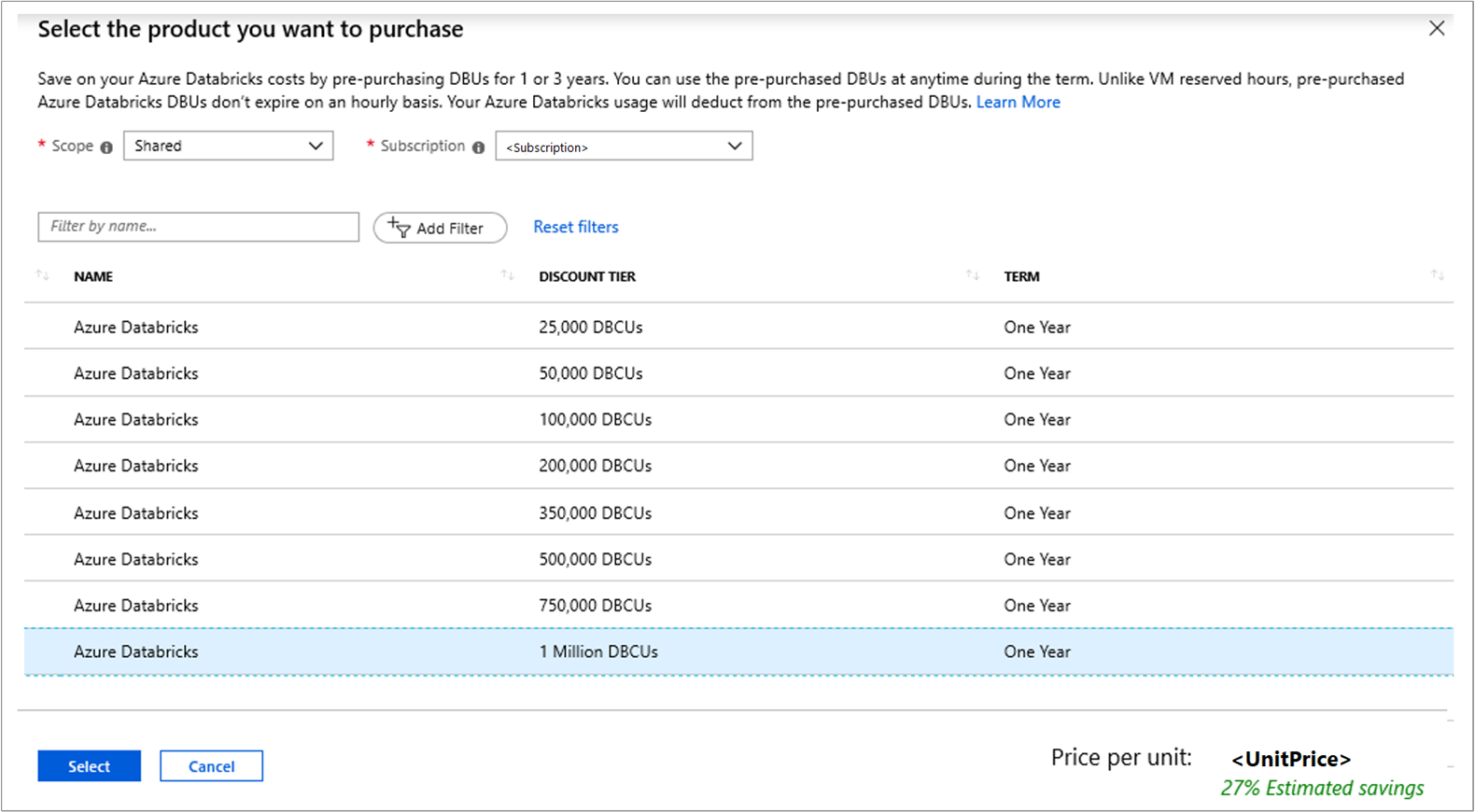Note
Access to this page requires authorization. You can try signing in or changing directories.
Access to this page requires authorization. You can try changing directories.
You can save on your Azure Databricks unit (DBU) costs when you prepurchase Azure Databricks commit units (DBCU) for one or three years. You can use the prepurchased DBCUs at any time during the purchase term. Unlike VMs, the prepurchased units don't expire on an hourly basis and you use them at any time during the term of the purchase.
Any Azure Databricks use deducts from the prepurchased DBUs automatically. You don't need to redeploy or assign a prepurchased plan to your Azure Databricks workspaces for the DBU usage to get the prepurchase discounts.
The prepurchase discount applies only to the DBU usage. Other charges such as compute, storage, and networking are charged separately.
Determine the right size to buy
Databricks prepurchase applies to all Databricks workloads and tiers. You can think of the prepurchase as a pool of prepaid Databricks commit units. Usage is deducted from the pool, regardless of the workload or tier. Usage is deducted in the following ratios:
| Workload | DBU application ratio - Standard tier | DBU application ratio - Premium tier |
|---|---|---|
| Interactive Serverless Compute | N/A | 1 |
| All-purpose compute | 0.4 | 0.55 |
| Automated Serverless Compute | N/A | 0.47 |
| Jobs compute | 0.15 | 0.30 |
| Jobs light compute | 0.07 | 0.22 |
| SQL compute | N/A | 0.22 |
| SQL Pro compute | N/A | 0.55 |
| Serverless SQL | N/A | 0.70 |
| Serverless real-time inference | N/A | 0.082 |
| Model training | N/A | 0.65 |
| Delta Live Tables | NA | 0.30 (core), 0.38 (pro), 0.54 (advanced) |
| All Purpose Photon | 0.4 | 0.55 |
For example, when All-purpose compute – Premium Tier DBUs are consumed, the prepurchased Databricks commit units get deducted by 0.55 units. When Jobs compute – Premium Tier capacity gets used, the prepurchased Databricks commit unit gets deducted by 0.30 units.
Note
Enabling Photon increases the DBU count.
Before you buy, calculate the total DBU quantity consumed for different workloads and tiers. Use the preceding ratios to normalize to DBCU and then run a projection of total usage over next one or three years.
Purchase Databricks commit units
You can buy Databricks plans in the Azure portal.
- To buy a reservation, you must have owner role or reservation purchaser role on an Azure subscription.
- For Enterprise subscriptions, Reserved Instances policy option must be enabled in the Azure portal. Navigate to the Policies menu to change settings.
To Purchase:
- Go to the Azure portal.
- Select a subscription. Use the Subscription list to select the subscription that gets used to pay for the reserved capacity. The payment method of the subscription is charged the upfront costs for the reserved capacity. Charges are deducted from the enrollment's Azure Prepayment (previously called monetary commitment) balance or charged as overage.
- Select a scope. Use the Scope list to select a subscription scope:
- Single resource group scope - Applies the reservation discount to the matching resources in the selected resource group only.
- Single subscription scope - Applies the reservation discount to the matching resources in the selected subscription.
- Shared scope - Applies the reservation discount to matching resources in eligible subscriptions that are in the billing context. For Enterprise Agreement customers, the billing context is the enrollment.
- Management group - Applies the reservation discount to the matching resource in the list of subscriptions that are a part of both the management group and billing scope.
- Select how many Azure Databricks commit units you want to purchase and complete the purchase.

Change scope and ownership
You can make the following types of changes to a reservation after purchase:
- Update reservation scope
- Azure role-based access control (Azure RBAC)
You can't split or merge the Databricks commit unit prepurchase. For more information about managing reservations, see Manage reservations after purchase.
Cancellations and exchanges
Cancel and exchange isn't supported for Databricks prepurchase plans. All purchases are final.
Need help? Contact us.
If you have questions or need help, create a support request.
Next steps
- To learn more about Azure Reservations, see the following articles: